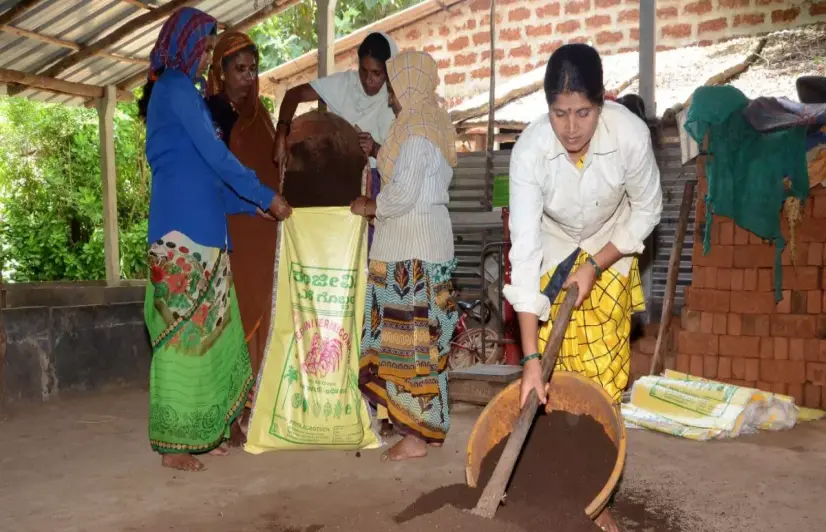Rural businesswoman's homegrown vermicompost courts customers across Karnataka

Rural businesswoman's homegrown vermicompost courts customers across Karnataka
Nagaveni Gollar (far right in white and yellow) at her vermicompost unit; (below) earthworms are also sold separately for those who want to try composting at home (Picture credit - Fakiraswamy Mattennavar)
For two decades now, Nagaveni Gollar has been making and selling natural fertilisers, securing a livelihood for her family while building a loyal customer base.
Haveri: The lack of formal education has not stopped Nagaveni Gollar (40) from running a successful business — neither has the pandemic. In fact, those returning to agriculture in the past few months have given her business a boost.
For the last 20 years, the resident of Lakshmipur village in Karnataka’s Haveri district has been farming and has been selling the vermicompost that she formulated on her farm, where she has cultivated banana and areca nut crops.
She beamed with pride when she recounted the fact that she started the business by herself. “We did not even have a shelter earlier. Now, we are well-settled,” she said.
Gollar has, in a true sense, cultivated her vermicompost fertiliser brand — Sanjeevani — over two decades by promoting zero-budget farming. There was no monetary investment involved. She picked the elements from her surroundings and turned it into a profitable venture that brings Rs 2.5-3 lakh every year.
Moreover, she has created jobs for 25 women
in the village.
Together, they have been producing 75-100 tonnes of fertiliser every year. She has also been selling at least 25-50 kg (priced at Rs 300/kg) of earthworms every month to those willing to produce their own vermicompost.
Truly homegrown
Gollar has a four-acre land from where she runs her venture. Her 'equipment' includes two kinds of earthworms — the eudrilus eugeniae popularly known as the African Nightcrawler and the eisenia fetida, more commonly known as red wigglers. They are recognised for their fast multiplication rates and relatively low maintenance. Further raw materials include grass, cow dung and other waste materials.
Gollar has five cows that are her primary source of dung. When the demand for her product spiked, she has had to purchase cow dung from neighbouring farmers.
These materials are brought together at the ten vermicompost pits under two sheds that essentially provide the required shade
and moisture.
At one shelter, the cow dung and chapped-dry leaves are mixed in 3:1 proportion. The worms are added and the whole mixture is left for 50-60 days to decompose. Gollar sprinkles water over certain periods to maintain the temperature for worms.
The mixture is then transferred to the second shed and cleaned with the help of the women workers. The compost mixture is filtered and Gollar makes use of the discarded portion to fertilise her farm.
Every sack of the compost weighs 50 kg and costs Rs 450. They are labelled neatly and sent away to the intra-state hauls.
(Clockwise from top left) Gollar and her colleagues put together the raw materials for the compost; the earthworms are added to the mixture; after decomposing for around two month, the compost is filtered; and weighed and packed into bags for shipping (Picture credit - Fakiraswamy Mattennavar)
Bypassing agents to ensure quality
The produce has courted customers from Haveri, Dharwad, Karwar, Davanagere, Belagavi, Udupi, Mangaluru, Shivamogga, Koppal, Ballari, Vijayanagar and Raichur. Demand from the neighbouring state of Maharashtra has been slowly rising, too.
While Gollar started marketing her product with the guidance of Pune-based NGO Bharatiya Agro Industries Foundation, the company now handles all the customers on its own. Gollar has refrained from handing over her product to agents. They have previously mixed Sanjeevani with low-quality produce, she said, and so she now directly deals with her customer base.
The customers are loyal, too. Some have relied
on Sanjeevani for a decade. T Shivakumar, a farmer from Shivamogga district has
bought the vermicompost from Gollar for eight years.
“The quality of Sanjeevani has been steady.
The product reaches me on time. It has benefitted my areca nut crop abundantly.
Gollar is a woman committed to her work and it shows in the quality of compost
that she produces. She has run her business very ethically,” he said.
Gollar’s husband, Babanna, told 101Reporters
that his wife is wholesomely responsible for the success of the fertiliser.
“I only look at the marketing end, whereas
she looks at customers and production. She has maintained the business and ensured
that our family flourishes,” he said.
Gollar is proud of her work. It has enabled
her to secure a good education for her children, along with a decent livelihood.
“Our son is studying food technology, our daughter just got into a college for a bachelor of science degree and our youngest son is in pre-university college,” she said.
Would you like to Support us
101 Stories Around The Web
Explore All NewsAbout the Reporter
Write For 101Reporters
Would you like to Support us
Follow Us On


